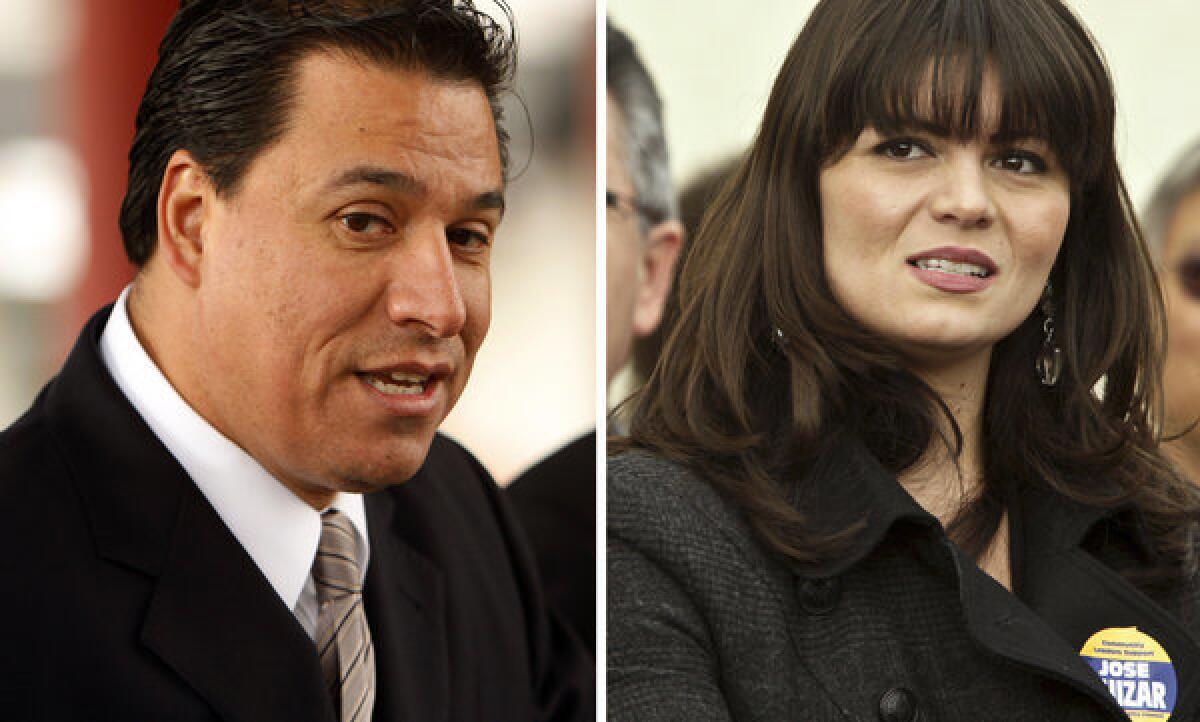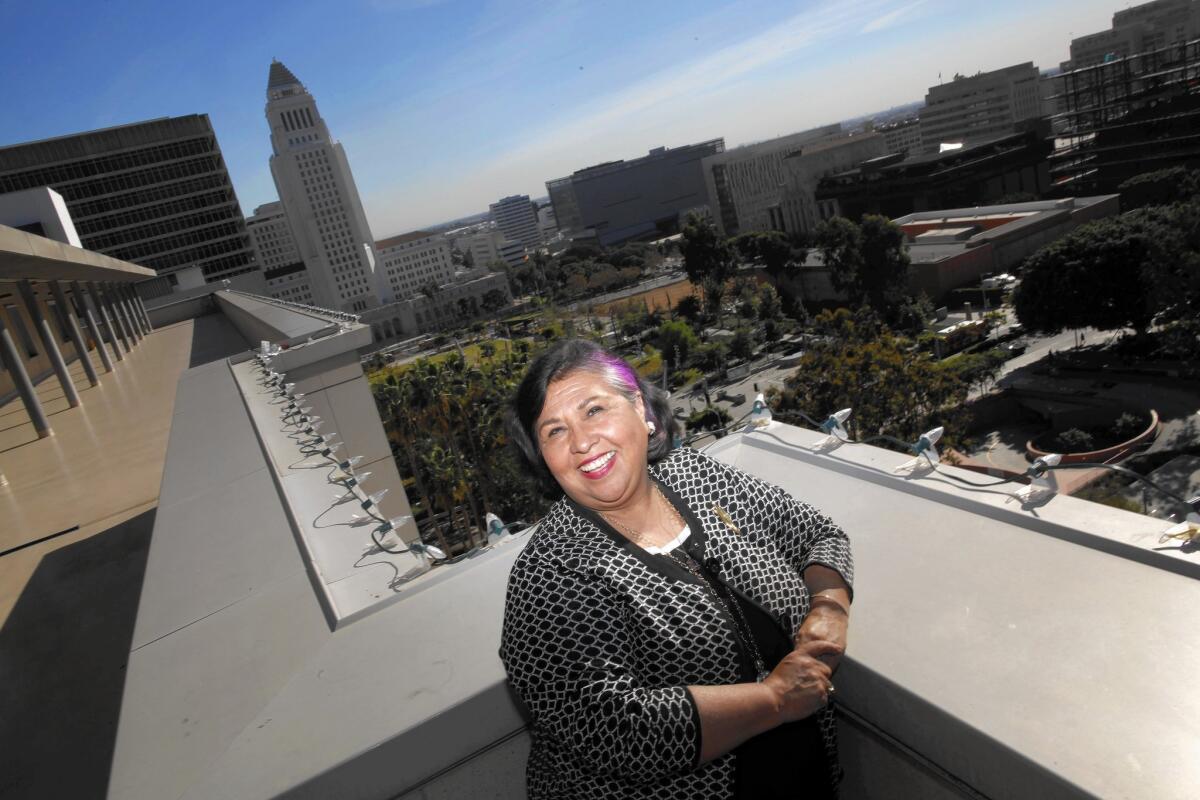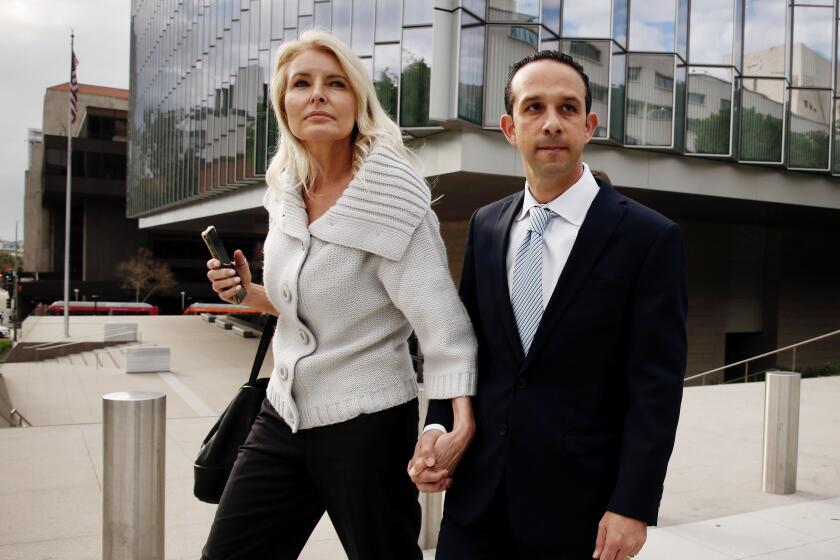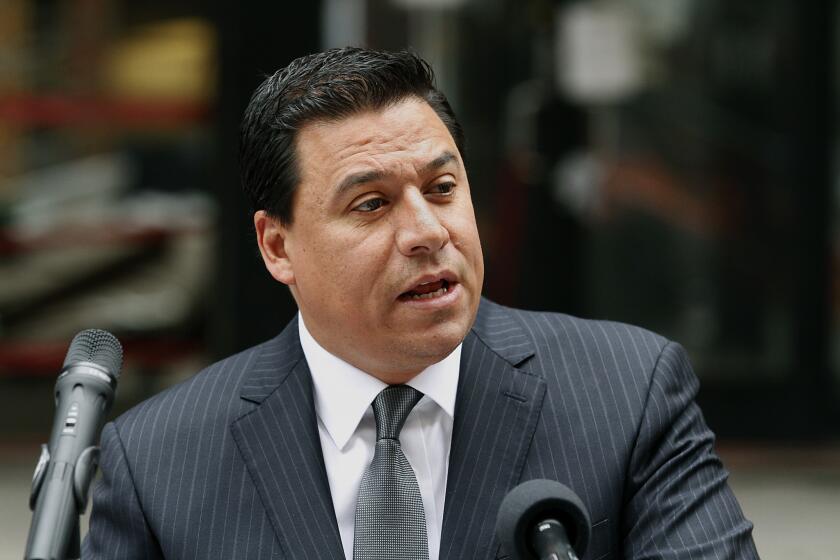Chinese billionaire helped L.A. councilman settle sexual harassment suit, feds say

- Share via
As Los Angeles City Councilman Jose Huizar was preparing to run for his third and final term in 2014, he was facing enormous political pressure.
County Supervisor Gloria Molina, one of the biggest names in Eastside politics, had just launched a campaign to unseat him. One of his former staffers had accused him of sexual harassment and was seeking a payout from the city.
Then, the lawsuit was abruptly settled. The city paid her nothing. And Huizar refused to say how he had persuaded Francine Godoy, his onetime deputy chief of staff, to drop her claims.
After nearly six years, that secret appears to have finally broken into public view, with a former Huizar aide agreeing to plead guilty in a sprawling federal corruption investigation and giving his — and prosecutors’ — version of events.
George Esparza, who worked as Huizar’s special assistant, said in his plea agreement that a Chinese billionaire doing business in Huizar’s district played a crucial role in helping the councilman settle the lawsuit.
The billionaire, named in federal filings only as Chairman E, had been looking to build a 77-story skyscraper in Huizar’s district. In 2014, the billionaire provided $600,000 in collateral as the councilman was applying for a loan, according to Esparza’s plea agreement.
As L.A. officials battle the coronavirus pandemic, a corruption scandal has fueled mistrust in City Hall.
The arrangement allowed Huizar to secure a $570,000 bank loan and pay the sexual harassment settlement, resolving it without any public disclosure of the details, according to Esparza’s plea agreement.
Had the city paid a financial settlement in the case, its terms would have become public. Private settlements need not be disclosed and often require the parties to promise never to discuss the case publicly.
Esparza, who lives in Boyle Heights, is the fourth person to agree to plead guilty in the sweeping investigation, which is still underway. His attorney did not respond to messages seeking comment.
Several city officials have called on Huizar to resign in recent weeks. Council President Nury Martinez did so Thursday, saying the latest filing directly implicates Huizar in “illegal, offensive and absolute abuse-of-power dealings.”
Mayor Eric Garcetti said he supported her call for Huizar’s resignation, saying the councilman had lost the trust of the public.
Molina, who ultimately lost to Huizar in the 2015 election, said this week that she wished the public could have been informed of the deal to finance the settlement before they cast their votes. Even then, she said, no one who knew Huizar believed that he had the ability to pay Godoy himself.

“Everybody knew he didn’t have that money,” Molina said in an interview. “Nobody would say how much [the settlement] was, but somebody had to have given it to him.”
Federal prosecutors have not named Huizar in any of their filings. But they have provided numerous details in court records that make clear that he is the councilman at the center of what they describe as a criminal enterprise that relied on bribes, extortion and other illicit activities.
Huizar’s attorneys have repeatedly declined to comment on the investigation. Godoy’s lawyer did not respond to The Times’ inquiries.
Prosecutors did not name the company seeking to build the 77-story skyscraper. But details in the federal filings match a project proposed by Shenzhen New World Group, which has been seeking to develop a 77-story tower on property occupied by the L.A. Grand Hotel Downtown on Figueroa Street. The Times was unable to reach a company representative for comment.
A former aide to L.A. City Councilman Jose Huizar has agreed to plead guilty to felony racketeering in the federal “pay-to-play” investigation at City Hall.
The Chinese billionaire ultimately provided more than $1 million in bribes to the councilman to help advance his company’s development plans, prosecutors said. Esparza admitted the developer provided him and his boss with “financial benefits” on more than a dozen trips to casinos in Las Vegas and Australia between 2014 and 2018, including free flights on private jets, gambling chips and expensive meals, court records show.
At one point, the Huizar aide told a co-worker that, considering what his boss owed, the developer “should have all the leverage in the world,” according to the federal filing.
Godoy filed her lawsuit in 2013, accusing Huizar of waging a “campaign of retaliation” against her after she rebuffed requests for sexual favors. She also alleged that he sabotaged her bid for a seat on the Los Angeles Community College District board and scaled back her responsibilities, ordering her to work from home.
“Plaintiff would sit at home much of her time with no work to perform since she was being retaliated against by Huizar due to her refusal to have sex with him,” the lawsuit said.
Huizar denied Godoy’s allegations, calling the relationship with her “occasional and consensual.” The councilman’s spokesman called Godoy’s claims “false and malicious” and said Huizar deeply regretted engaging in the extramarital affair.
“He and his wife are currently working on repairing their marriage,” the spokesman, Robert Alaniz, said at the time.
With the lawsuit underway, an influential figure at City Hall emerged to help Huizar find a solution, prosecutors said this week.
Ray Chan, then the top executive at the city’s Department of Building and Safety, urged the Chinese billionaire to provide the $600,000 needed to resolve the councilman’s sexual harassment lawsuit, according to details in the federal filing.
Prosecutors did not name Chan in their filing, identifying him as Individual 1, but included key biographical details that match his resume.
The billionaire provided the financial help after the councilman had introduced a motion to help ensure the Building and Safety executive kept his job, according to the filing.
Prosecutors did not provide further details on that motion. However, at a 2013 committee meeting, Huizar made an amending motion to put off a plan to combine Chan’s agency with another city department — a move that may have prevented the loss of jobs in his agency.
Chan’s attorney had no immediate comment on the latest allegations. But he previously has said Chan did nothing wrong.
In exchange for putting up the collateral, the billionaire began asking for “a series of favors,” prosecutors said. By 2017, one of the developer’s executives was applying pressure, reminding Esparza of the help the billionaire had provided, prosecutors said.
Prosecutors said that in one phone call with Esparza, a company executive made clear that the developer expected help with the skyscraper project — or else the councilman would have to “pay back that $600,000.”
The federal filings indicate that by December 2018, weeks after the FBI raided Huizar’s home, the councilman had failed to make three interest payments on the bank loan that allowed him to settle the harassment lawsuit.
That month, the bank that issued the $600,000 loan tapped the collateral provided by the billionaire, according to the federal filing. That move, prosecutors said, meant Huizar no longer had to pay back the remaining $575,000 he owed the bank.
More to Read
Sign up for Essential California
The most important California stories and recommendations in your inbox every morning.
You may occasionally receive promotional content from the Los Angeles Times.














